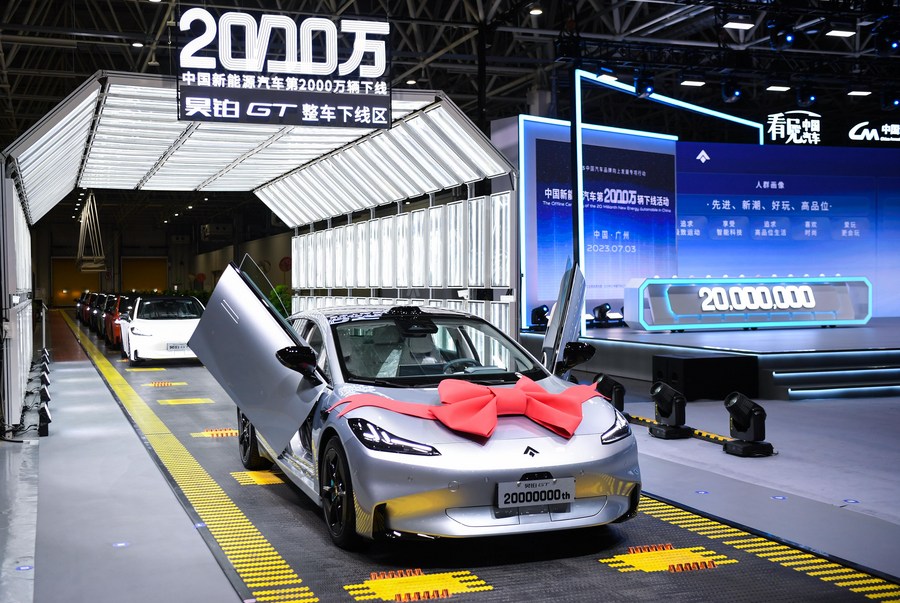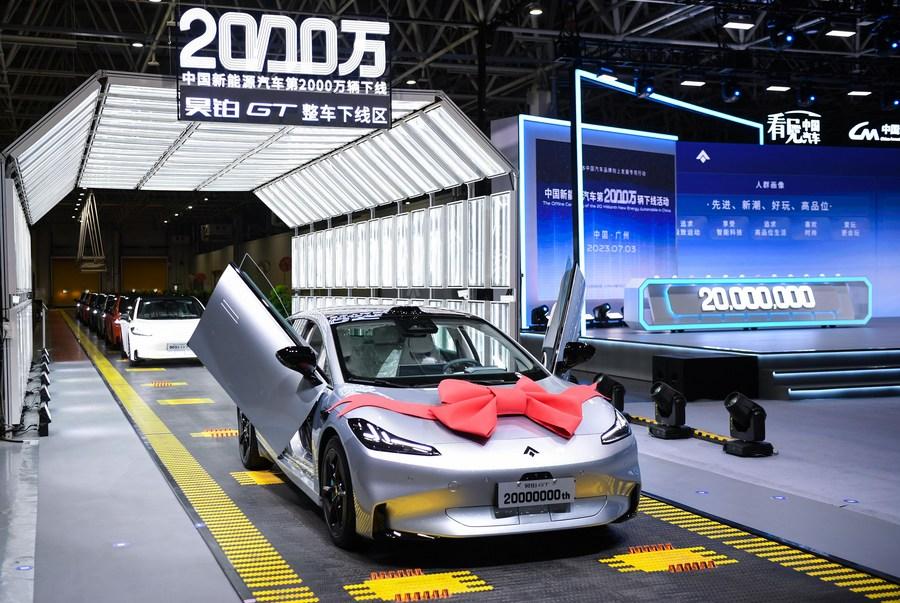
This photo taken on July 3, 2023 shows China's 20 millionth new energy vehicle (NEV) produced by GAC Aion New Energy Automobile Co., Ltd. in Guangzhou, south China's Guangdong Province. (Xinhua/Deng Hua)
BEIJING, July 13 (Xinhua) -- With China's 20 millionth new energy vehicle (NEV) recently rolling off the production line, the country's NEV sector witnessed a remarkable milestone that indicates a new level of development scale and globalization.
At the 2023 China Auto Forum held from July 5 to 7 in east China's Shanghai, experts, government officials and industry insiders shared insightful opinions on the development path of China's NEV sector.
-- Dual support of policy, market
China's cumulative NEV output exceeded 5 million in September 2020 and 10 million in February 2022, which means the second 10 million only took one year and five months after that, displaying the "China speed".
Participants at the forum agreed that such rapid development of China's NEV sector in the past decade fully reflects the effectiveness of China's policy support in industrial transformation.
Statistics from the Ministry of Industry and Information Technology shows that more than 70 policy measures supporting the development of the NEV industry have been released by relative departments in recent years, followed by local departments issuing specific policies according to their own development conditions.
From the implementation of industrial technology innovation projects to the establishment of national manufacturing innovation centers for power batteries and such, the series of measures have laid out clearer direction for NEV development and encouraged market entities to forge ahead in firmer pace.
At the mean time, thanks to the subsidy policies for purchasing NEV and the measures promoting NEVs in rural areas, the industry's transformation is also largely encouraged by the consumer side, with rapid market expansion driving innovation of industrial chains.
From material system to battery structure, the rapid growth of market has been pushing the battery industry toward cutting-edge development, according to Wu Kai, chief scientist at Contemporary Amperex Technology Co., Limited (CATL), a battery producer in China. The Qilin battery launched by CATL can last over 1,000 kilometers upon one charge, Wu introduced at the three-day forum.
It has been proved that the cultivation of the market has accelerated the improvement of NEV industry system, said Fu Bingfeng, executive vice-president of the China Association of Automobile Manufacturers (CAAM).
With intensive introduction of policy measures to stimulate consumption and strengthen capacity building of industrial support, market expectations will be further stabilized, promoting high-quality industrial development, according to Fu.
-- Technological breakthroughs strengthen industrial chain
Through years of cultivation, China's NEV industry has developed mature industrial system, as well as technological advantages. As technological innovation composes the core competitiveness of industrial development, it is still necessary for the NEV sector to strengthen the layout in the fields of key and cutting-edge technologies.
"Breakthroughs in basic software and operating systems are in need, as there is still a long way to go in tackling core technologies," said Wang Jun, president of Changan Automobile Group, pointing out that attentions should be paid to issues such as whether the products can meet consumer expectations, whether the companies can create greater value for users in terms of stability of technological routes and so on.
It is also worth taking into consideration the integrated innovation of industrial chains, according to Xu Jun, senior vice president of Zhejiang Leapmotor Technology Co., Ltd. In the digital era, it is of significant importance to consolidate and expand the advantages of NEV industrial chain through integrated innovation, said Xu.
A key to promote NEV industrial transformation is to establish a coordinated development model among various fields including auto chips, software and operating systems, according to Li Shaohua, deputy secretary-general with the CAAM. Li proposed that chip manufacturers, software suppliers and research institutions should jointly build sharing platforms of common technologies, as a bid to increase the stability and resilience of the supply chain in general.
It is also expected that the brand advantages of foreign auto companies should be integrated with local innovative efforts in China, strengthening technological cooperation under open ecology, according to Wang Jing, a representative with General Motors. (Edited by Yu Huichen with Xinhua Silk Road, yuhuichen@xinhua.org)




 A single purchase
A single purchase









